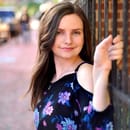This summer, some friends and I had the privilege of visiting Israel and Palestine to learn more about a conflict that I had previously only seen in textbooks. We were able to leave messages of peace along the Gaza border and speak to terror attack survivors; we ate lunch in the West Bank with a Palestinian family and dinner in Jerusalem with a Jewish one. After interacting with all these people and seeing their varying perspectives and journeys, the most significant thing I learned is just how little I truly know. Reading about a subject is one thing, but experiencing it is a different thing altogether.
After all, anybody can sit in a classroom and recite historical dates and treaties. A robot can do that. Education is so much more than information that can be memorized; true knowledge is understanding another person’s way of life. Taking the time to start listening- and I mean listening to hear, not listening to respond- is one of the best things that we can do to promote peace, whether we’re in the Middle East or our own backyards.
The ability to truly see another person is something that we have to relearn from our youth. Children aren’t born with hatred- they’re born wanting to play. This summer, I was able to visit a kindergarten opened by an interfaith couple in Jaffa, a beautiful coastal city in Israel. In a country that is often divided along religious, ethnic, and historical lines, we were able to hear the laughter of Jewish and Arab children as they learned alongside each other. They are taught to speak two languages, appreciate a myriad of cultures. After all, if we can teach people how to hate we can also teach them how to love.
I have heard about so many relationships that transcend both politics and expectations. Ihab Balha, a Muslim Arab, told me how he fell in love with his Jewish wife at first sight. Lian Najami, who identifies as an Arab Israeli, spoke nostalgically about her earliest friend, a Jewish girl. As they grew up, she said, they would be confused about the stereotypes they were being told about the other, knowing that these descriptions were untrue.
These stories remind me that even where there is conflict, there isn’t just conflict. Sometimes when all you see in the news are stories of violence and hatred, it’s easy to forget that every day in these areas, people fall in love and get married. They visit the market on Friday afternoons to haggle over vegetable prices. Anywhere you look, people are still going about their lives, and there’s something wonderful about that.
To close with another thought from Najami: ignorance and generalization are the two great enemies of understanding. Society can’t change on a larger scale until we meet each other on a more basic, human level. I don’t think that there’s any easy pathway to peace, but I also believe that peace doesn’t begin with politicians or governments. It begins when people talk to their neighbors.
Photos courtesy of author.



